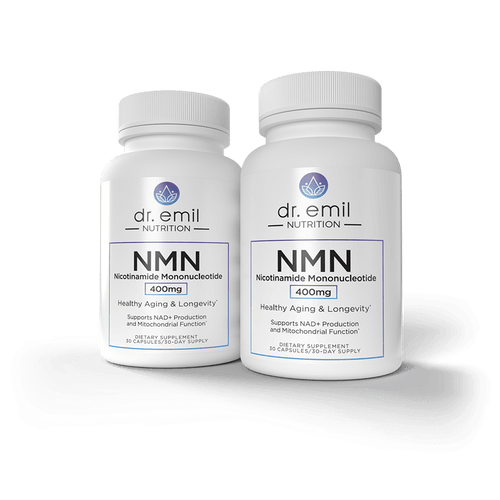In a world where the pursuit of longevity and vitality remains an enduring quest, the exploration of supplements such as Nicotinamide Mononucleotide (NMN) has ignited hope. This compound, a precursor to the critical coenzyme nicotinamide adenine dinucleotide (NAD+), has emerged as a beacon in the realm of anti-aging science and cellular rejuvenation.
NMN's allure lies in its potential to bolster cellular health, enhance energy metabolism, and potentially mitigate the effects of aging. However, as the excitement surrounding NMN grows, so too does the need for a comprehensive examination of its safety profile. This scrutiny is necessary to separate the promise from potential pitfalls associated with its supplementation.
What is the Risk of Taking NMN?
The utilization of NMN as a supplement has sparked interest due to its potential anti-aging properties, but understanding the risks associated with its consumption is pivotal. As a naturally occurring compound in the body involved in cellular energy production, NMN supplementation might seem innocuous. However, diving deeper reveals nuances that warrant consideration.
One of the primary concerns surrounding NMN supplementation revolves around limited human studies. While research in animal models has shown promise, extrapolating these findings to human biology requires cautious interpretation. Reported side effects of NMN in humans are generally mild, ranging from transient gastrointestinal discomfort to occasional allergic reactions. However, the lack of extensive long-term human studies means that potential risks remain uncertain.
Variations in individual responses and interactions with other medications or pre-existing health conditions underscore the need for tailored guidance. Individuals with underlying medical issues, such as liver complications or metabolic disorders, should exercise caution and seek medical advice before initiating NMN supplementation. Additionally, while NMN is a precursor to NAD+, excessive dosages or improper use could potentially disrupt cellular pathways or lead to unintended consequences, emphasizing the necessity for prudence in dosage and administration.

The regulatory landscape for supplements can be nebulous, leading to concerns about product quality, purity, and the reliability of the dosage stated on labels. These uncertainties underscore the importance of sourcing NMN from reputable manufacturers and verifying product certifications to ensure safety and efficacy.
While initial indications suggest that NMN supplementation is generally safe, comprehensive human studies encompassing diverse populations and long-term observations are imperative. As with any supplement, understanding and mitigating potential risks require meticulous consideration, especially when integrating NMN into daily health regimens.
Is It OK to Take NMN Every Day?
Determining the safety and efficacy of daily NMN supplementation presents a multifaceted challenge. As the pursuit of longevity and cellular rejuvenation intensifies, the question of sustained NMN intake warrants careful scrutiny.
Currently, conclusive evidence regarding the optimal dosage, frequency, and long-term effects of daily NMN supplementation in humans remains elusive. While animal studies have showcased promising outcomes, translating these findings to human biology necessitates cautious interpretation. This lack of extensive human trials makes it challenging to definitively ascertain the safety and effectiveness of habitual NMN consumption.
Individual responses to NMN supplementation may vary, influenced by factors such as age, genetics, lifestyle, and existing health conditions. Moreover, potential interactions between NMN and other medications underscore the importance of consulting healthcare professionals before integrating NMN into daily regimens. Such consultations are particularly crucial for individuals with underlying health issues or those taking medications that might interact with NMN.

Concerns about potential side effects from prolonged NMN usage also linger. Without comprehensive human studies, the possibility of adverse effects arising from extended daily intake cannot be entirely ruled out. The absence of clear guidelines regarding the ideal dosage or the long-term implications of NMN supplementation further accentuates the need for prudence.
As with any supplement, moderation and informed decision-making are crucial. Considering the evolving nature of scientific research and the intricate complexities of human biology, exercising caution and periodically reassessing the need for NMN supplementation is advisable. Engaging in open dialogues with healthcare providers and staying informed about the latest research findings will assist in making informed choices regarding the frequency and duration of NMN supplementation. Ultimately, personalized guidance and a cautious approach remain paramount when considering the incorporation of NMN into daily health routines.
Is NMN Toxic to the Liver?
The potential hepatotoxicity, or liver toxicity, associated with NMN has been a subject of concern and investigation, albeit with varying outcomes in different studies. NMN's role as a precursor to NAD+, a crucial coenzyme involved in cellular energy production, has raised questions about its impact on liver health.
Current scientific evidence from animal studies suggests that NMN, when administered in moderate doses, does not exhibit significant liver toxicity. However, extrapolating these findings directly to human biology necessitates a cautious approach. Human studies evaluating NMN's specific effects on liver function are limited, leading to a lack of conclusive evidence regarding its hepatotoxic potential.
Individual variability in responses to NMN and the potential for adverse effects cannot be overlooked. Certain pre-existing liver conditions or metabolic disorders might interact with NMN supplementation, amplifying the risk of liver-related complications. Therefore, individuals with liver ailments should exercise prudence and seek guidance from healthcare professionals before considering NMN supplementation.
The absence of standardized guidelines for NMN dosage and long-term safety data adds complexity to the discussion. While initial findings suggest that moderate NMN intake might not pose a significant threat to liver health, ongoing research is crucial to comprehensively assess its impact, especially in diverse populations and over extended periods.
To ensure safety, regular monitoring of liver function through clinical assessments is advisable for individuals using NMN supplements. Maintaining open communication with healthcare providers and being vigilant about any signs of adverse reactions while supplementing with NMN remains essential. As scientific inquiry continues to unravel the complexities of NMN's effects on the liver, cautious and informed decision-making, coupled with professional guidance, remains pivotal for those considering NMN supplementation.
What Age Should You Start Taking NMN?
Determining the ideal age to commence NMN supplementation can be complex, influenced by various factors ranging from individual health status to the current stage of scientific understanding. The desire for prolonged healthspan and vitality has sparked interest in interventions aimed at supporting cellular health, leading some to consider early NMN supplementation. However, the lack of comprehensive long-term human studies on NMN's effects on different age groups makes it challenging to establish a definitive starting age.

While some advocate for an early start to potentially preserve cellular health and mitigate age-related decline, caution is warranted. Early initiation of NMN supplementation lacks substantiated guidelines due to the intricate interplay of biological responses, individual variability, and the potential for unforeseen effects, particularly in younger populations.
However, others also emphasize the need for prudence, suggesting that waiting for more comprehensive research in humans might be a judicious approach. Focusing on established lifestyle practices, including a balanced diet, regular exercise, and healthy habits, remains fundamental for overall well-being across all age groups.
Individual health status, genetics, and environmental factors also play pivotal roles in determining the suitability of NMN supplementation. Consulting healthcare professionals before initiating NMN, especially for individuals with underlying health conditions or those taking medications, is essential to navigate potential interactions and ensure safety.
As scientific inquiry progresses, with more targeted studies exploring NMN's effects on different age cohorts, clearer guidelines might emerge. Until then, personalized guidance from healthcare providers, coupled with a holistic approach to wellness, remains paramount. Engaging in regular discussions with medical professionals and staying abreast of emerging research will assist in making informed decisions regarding the commencement of NMN supplementation at an appropriate age.
What is the Proper Dosage of NMN?
Determining the appropriate dosage of NMN supplements remains a pivotal yet challenging aspect in incorporating this compound into daily health regimens. As research on NMN's optimal dosage in humans is still evolving, establishing standardized guidelines proves complex.

Current NMN supplementation recommendations typically range between 100 mg to 1000 mg per day, divided into multiple doses. However, this range varies widely based on individual factors, including age, weight, health status, and metabolic differences, making a one-size-fits-all approach impractical.
Initiating NMN supplementation at lower doses and gradually increasing it allows individuals to gauge their body's response and potential tolerance to the supplement. This cautious approach assists in mitigating the risk of adverse reactions and enables better monitoring of any side effects that might arise.
Integrating NMN supplements into daily routines often involves considering concurrent factors, such as diet, lifestyle, and the presence of other medications or supplements. Consulting healthcare professionals before commencing NMN supplementation is crucial, as they can provide personalized recommendations based on individual health profiles and potential interactions with existing medications.
Understanding that the optimal NMN dosage might differ among individuals, maintaining open communication with healthcare providers and periodically reassessing the need for supplementation is essential. This approach ensures that NMN supplementation remains aligned with individual health goals while minimizing potential risks.
As ongoing research endeavors seek to elucidate the precise dosage thresholds and long-term effects of NMN supplementation, the collaboration between scientific advancements and personalized guidance from healthcare professionals will refine our understanding of the ideal dosage to support healthy aging and cellular rejuvenation.
Does NMN Actually Work?
The question of whether NMN truly delivers on its touted promises of enhancing longevity and cellular rejuvenation is a subject of ongoing scientific investigation, evoking both intrigue and skepticism within the realm of health and wellness.

Initial research, predominantly conducted on animal models, has shown promising results. NMN's role as a precursor to NAD+, a pivotal coenzyme involved in various cellular processes, has sparked enthusiasm for its potential to bolster cellular health, energy metabolism, and potentially mitigate age-related decline. Studies in animals have indicated positive impacts on various aspects of aging, such as improved mitochondrial function, enhanced DNA repair, and increased lifespan in certain organisms.
However, the translation of these promising findings from animal studies to human efficacy remains a subject of contention and ongoing exploration. Human trials evaluating NMN's effects on aging and overall health are still in their infancy, lacking comprehensive data to unequivocally establish its effectiveness in humans.
While anecdotal reports and early human studies suggest potential benefits, the lack of large-scale, long-term trials and standardized dosages hinders conclusive judgments regarding NMN's efficacy. Factors such as individual variability, optimal dosages, and variations in response across diverse populations add complexity to assessing its true effectiveness.
As the scientific community endeavors to unravel the intricacies of NMN supplementation, questions persist regarding its consistency, reliability, and long-term impacts. Rigorous, well-designed human studies encompassing diverse cohorts and assessing various health parameters over extended periods are essential to ascertain NMN's true efficacy in promoting healthspan and mitigating age-related decline.
Until robust and comprehensive evidence emerges from human trials, the efficacy of NMN in humans remains a topic of scientific scrutiny and exploration, prompting cautious optimism but also underscoring the need for patience and further investigation to substantiate its purported benefits.

In the pursuit of unraveling the potential benefits and risks of Nicotinamide Mononucleotide (NMN) supplementation, one thing remains abundantly clear: the landscape of anti-aging interventions is in a state of continual evolution. While initial research sparks optimism about NMN's role in cellular rejuvenation, the quest for conclusive evidence necessitates patience and rigorous scientific inquiry.
As we navigate the allure of NMN and its promise in promoting healthy aging, responsible decision-making, grounded in consultation with healthcare professionals, emerges as a guiding principle. Remaining attentive to emerging research findings, maintaining a balanced lifestyle, and exercising prudence in supplement use will shape a more nuanced understanding of NMN's potential role in our quest for vitality and longevity. With time, comprehensive studies will shed clearer light on NMN's efficacy, fostering informed choices and reshaping the future of aging interventions.






